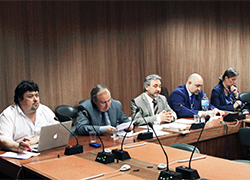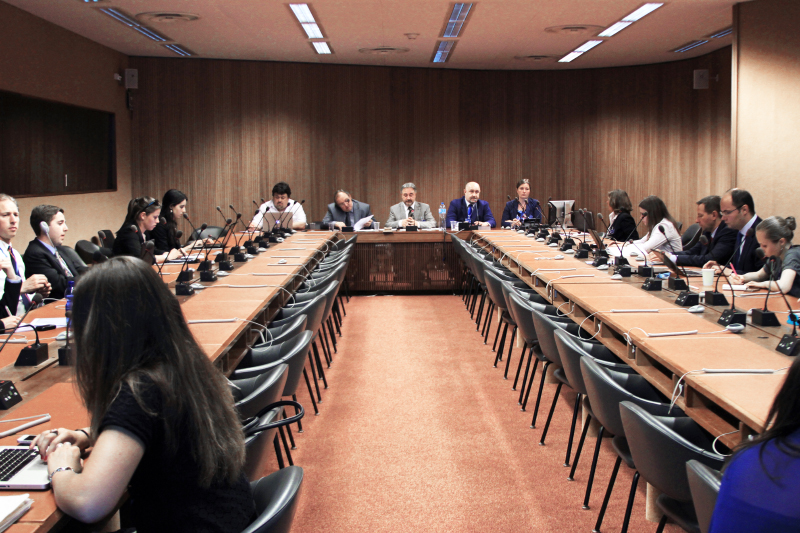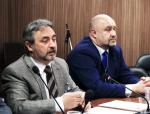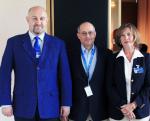Nobody is forgotten, nothing is forgotten
6- 18.06.2014, 16:34
- 20,917

Tortures in Belarusian prisons were discussed at the UN.
The hearings “Human Rights in Belarus and Turkmenistan: Forcible Abductions and Tortures” have been held at the UN Office in Geneva. They had been organized by Human Rights Watch organisation, the Platform of Civil Solidarity and “Prove They Are Alive!” campaign.
Among the participants of the event were the United Nations Special Rapporteur on the situation of human rights in Belarus, Miklós Haraszti, the deputy Standing Representative of Poland by the UN Office in Geneva Jerzy Baurski, a former political prisoner Zmitser Bandarenka, the leader of “We Remember” initiative Iryna Krasouskaya, a representative of the Working Group on Investments of the Committee of International Control over the Human Rights situation in Belarus Yury Dzhibladze and Volha Zakharava, one of the leaders of “Prove They Are Alive!” campaign Bayram Shikhmuradov, a representative of the Russian Human Rights Defence Centre “Memorial” Vitaly Panamaryou, as well as members of delegations of the UN member countries.
In an interview to charter97.org website the participant of the hearings, a former political prisoner Zmitser Bandarenka, has told about tortures in Belarusian prisons.
- Zmitser, what have you talked about at the hearings in the UN?
- I was asked to tell about my personal prison experience and about tortures used in Belarusian prisons against prisoners, including political prisoners. Recently dictator Lukashenka, speaking about the World War II, said that Belarusians are guided by the principle “Nobody is forgotten, nothing is forgotten!” I believe these words are relevant when we are speaking about the current events in Belarus, too.
Such prison names as Abu Ghraib and Guantanamo, but not so many people know the name of Minsk prison, “Amerikanka” (the KGB remand prison in Minsk), where hundreds of representatives of Belarusian intellectuals;, scientists, writers, philosophers were shot dead in 1930ies, and in 2010 candidates for presidency in Belarus and their election staffers underwent tortures and humiliating treatment.
- Have you told about your firsthand experience? We know that you have come through tortures.
- I told about what all political prisoners of “Amerikanka” have come through. I told that all political prisoners even had no personal sleeping accommodations, each of us had just wooden planking which was removed during the daytime (by the way, the prisoner of Amerikanka Larysa Heniyush (1948-1949) wrote about that). I told about the torture by toilet, or rather by its absence in most cells, about almost daily humiliating treatment during collective and individual searches and personal inspections, when naked people were made to stand in awkward position for a long time, or to do physical exercises. And all that was accompanied by jokes with sexual undertones and cracking of stunning electric shock devices.
I told about beating of prisoners, about night interrogations and obligatory brainwashing 6-hour-long TV programs, which remind the ones demonstrated at Russian TV now, about lack of access to lawyers’ services.
I also told about my experience of sitting in a cell chained, about failure to assist while I was sick, about a torture when a person is taken for a walk amid strong frost, when hands are behind one’s back squeezed by handcuffs.
- Why were you chained up?
- The night before I had intense stomach pain, and I asked to call in ambulance. No one called in ambulance naturally, and in the morning the prison doctor told me: “Dear, your ulcer has opened.” I was returned to the cell and told to pack my things.
When I parted, my cell-mates said goodbye and said: “Well, you will be probably taken to a hospital.” Instead of that the prison governor Arlou (Orlov) came in and announced that I was sentenced to 10 days in punishment cell for violation of prison regulations. After that all my things were seized from me and I was taken to an isolation cell.
There my left arm was chained to a hook on the wall. The chain was one metre long. That’s how I “had fun” until the evening.
- What was the most striking thing in your story for participants of the hearings?
- Two things. Most of interrogations were carried out by persons who didn’t introduce themselves. One of the incognito interrogators was the current Interior Affairs Minister Ihar Shunevich. They were also stunned that all these interrogations, tortures and humiliating treatment were aimed at achieving one goal – signing a document about collaboration with Belarusian special services. Only men who signed such papers were released.
Amerikanka was the first circle of hell for other political prisoners.
- Have you told about masked people in the KGB prison?
- Yes, certainly. Exactly these people seized the printouts of internal regulations from our cells, saying to prisoners that no laws act toward us. When I was made to run up the steep staircase with all my things, I said I could not run as I am a physically challenged person, and my leg is partially paralyzed. The masked persons started to laugh loudly and said: “You are not a disabled person still, but we are going to make you one…”
- Iryna Krasouskaya, the widow of the businessman abducted in Belarus, delivered a speech at the hearings as well.
- In the speech of Iryna I was really distressed by her words that 15 years had passed till the moment of her husband Anatoly Krasouski and Viktar Hanchar’s abduction and death, and those guilty of this crime have not been punished still.
Such hearings at the UN are necessary, among other things, so that existing and possible criminals from dictatorial countries to know that they would not be able to conceal anything, that we remember about our late friends and, no matter what, we are going to investigate all the cases of forcible abductions, tortures and murders.
- During the hearings not only the situation in Belarus, but the situation in Turkmenistan was discussed as well. Are parallels possible here?
- There should be no justification for criminals and murderers only because they are committing their discreditable practices are taking place in Asia or Africa. Bayram Shikhmuradov, who addressed the audience of the hearings, told how his father, the minister of Foreign Affairs of Turkmenistan, as well as his uncle, cousin and many other high-ranking officials of Turkmenian government, were sentenced to 25 years’ terms of imprisonment in 2002 for “an assassination attempt” against President Niyazov. Since that time no one saw these persons.
In a conversation with me Bayram said that one can easily notice how Putin and Lukashenka adopt Central Asian methods of rule. For many people it was a sensation when Prince Zeid Ra'ad Zeid al-Hussein of Jordan was approved as the new UN High Commissioner for Human Rights. He stated that he was happy that the time has come when the issue of human rights protection would be raised publically and discussed aloud at the Middle East.
- With what dictatorships could be countered by the democratic world today?
- With solidarity. These hearings have been organized by our friends, Russian human rights activists Olga Zakharova and Yury Dzhibladze. Representatives of the countries, who have firsthand experience about what is a dictatorship, took part in the hearings.
The deputy Standing Representative of Poland by the UN Office in Geneva Jerzy Baurski stated that human rights protection in Belarus and in other post-Soviet countries is to stay a permanent priority of the Polish foreign policy.
The United Nations Special Rapporteur on the situation of human rights in Belarus, Miklós Haraszti noted the necessity of immediate release of all political prisoners of Belarus, and the importance of these hearings. The UN is to actively use all the information and all recommendations.
Mr. Haraszti has also noted that countries should not be divided into more important and less important, as far as human rights protection is concerned. Many considered Lukashenka to be the last European dictator, and he turned out to become one of the first new dictators, whose path was followed by Putin. In any democratic country there is always a risk of totalitarianism germination, and we should remember that.














